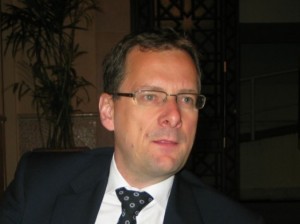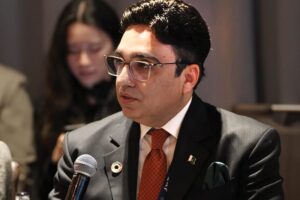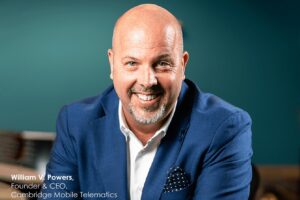Steve Collar, CEO – O3b Networks
Exclusive interview by: Gulraiz Khalid
 O3b Networks, Ltd. is a next generation network service provider building the world’s first Medium Earth Orbit satellite constellation. The network will combine the ubiquitous reach of satellite with the speed of fiber to deliver satellite Internet services and mobile backhaul services to emerging markets. The organisation has financial backing from the likes of Google, HSBC, Liberty Global, Allen and Company and Northbridge Venture Partners etc. and seems more than capable to achieve the mission it is set out to accomplish, which is to serve the ‘Other 3 Billion’ people on the earth who are not yet connected to a broadband network. Teletimes got the opportunity for an exclusive interview with the CEO of O3b Networks, Mr. Steve Collar, The transcript of which is given following for our readers.
O3b Networks, Ltd. is a next generation network service provider building the world’s first Medium Earth Orbit satellite constellation. The network will combine the ubiquitous reach of satellite with the speed of fiber to deliver satellite Internet services and mobile backhaul services to emerging markets. The organisation has financial backing from the likes of Google, HSBC, Liberty Global, Allen and Company and Northbridge Venture Partners etc. and seems more than capable to achieve the mission it is set out to accomplish, which is to serve the ‘Other 3 Billion’ people on the earth who are not yet connected to a broadband network. Teletimes got the opportunity for an exclusive interview with the CEO of O3b Networks, Mr. Steve Collar, The transcript of which is given following for our readers.
Gulraiz Khalid – Please talk about the background of O3b networks, its vision and the inspiration behind it.
Steve Collar – ‘O3b’ stands for the ‘Other 3 Billion’ people in the world who do not have access to a broadband internet connection. Our view is that the Internet has become ‘the’ means for people to communicate and ‘the’ means for people to do business and we believe that everyone should have an opportunity to participate in that phenomena. The economic and social benefits are tremendous in areas where people are connected to broadband. Businesses flourish, regions develop and that’s really where the idea for O3b comes from.
I’d also like to share quite interesting story here. Our founder, Greg Wyler was running a telecom company in Rwanda, Africa, about six years ago. He was pretty frustrated by not being able to get high quality fiber solutions, and from that he had this idea that if you can’t get high quality terrestrial solutions into a region, there’s another combination through which you can get a fiber like service.. So this story stems from a very real world, practical frustration of not being able to get high quality connectivity in a developing market.
GK – You have your main focus on the emerging markets. What is the idea behind that strategy?
SC – It’s true that we’re focusing on the emerging markets because it’s where the need for our kind of service/product is required. Our MEO satellites are four times closer to the earth than traditional GEO satellites and therefore provide faster internet connections. We don’t necessarily see the developed world as having a particularly good market for the high capacity, low latency solutions that we offer. It does not mean we will not deploy them for niche applications in developed markets but our focus is mainly on the emerging markets.
GK – The O3b orbit is much closer to the earth than geo-stationary satellites. Would you like to explain to our readers, how these MEO satellites are going to be better than the previous ones and other predeceasing technologies?
SC – Our satellites are four times closer to the earth thangeo-stationery satellites which have to maintain a huge distance from the earth. Our satellites have latencies which are four times lower and latency is becoming increasingly important in all IP applications ranging from voice to web services to cloud computing. This gives us a performance edge that cannot be achieved through traditional satellite connections.
GK – Apparently, one connection is going to be using 8 satellites throughout the day and will switch over to the next satellite when the previous one passes by as the speed at which these satellites will orbit is very fast. So is there going to be some sort of disconnectivity when the modem switches from one satellite to the other?
SC – There will be no disconnectivity and it’s an absolutely seamless connection. The modem which the customer will use will automatically detect which is the primary satellite to receive service from and will automatically connect to that with no effect on customer service. Our antennas on the ground actually move very slowly, about the speed of the minute hand on your watch.
GK – What exactly is the change that O3b is trying to bring to the internet ecosystem and how will the end users be affected through it?
SC – The developing world is dependent on mobile networks, not fixed networks for its telecoms. And increasingly when we’re talking about mobile services, we’re talking about data and services that can be delivered over IP. They include voice, data to handheld devices and video. So the revolution that we will bring is that we’ll make those connections more affordable and give them higher quality from the lower latency that we will provide.
I think what we’ll see as a result of O3b’s deployment is that mobile operators for example, will be able to provide data services, IP services further into the network. It will be more affordable for them to do that. So from the users’ perspective, you’ll get data coverage in areas where it won’t be possible to get it otherwise.
GK – What is O3b’s current position regarding customers?
SC – The important thing as always is our customers. We have customers in all regions of the world in which we operate. We have customers in Latin America, in Africa, in Middle East, in South Asia and the Pacific. Today we can say we are a truly global business.
GK – Some of our readers will be very interested in your agreement with Etisalat to provide Backhaul services.
SC – This is one of the most important customer agreements that we have signed to date. We have a global frame agreement with Etisalat,which allows all the regional and local operators of Etisalat to use the O3b network of satellites. We are the only satellite operator to have such an agreement and we appreciate the confidence that Etisalat has shown in us, confidence born from a year of diligence on their part.
GK – Are we looking forward to any agreements of such nature in the near future?
SC – That’s clearly our objective. We see ourselves as becoming an integral part of mobile network operators’ infrastructure and we see Etisalat as the first of many.
GK – Please talk about your relationship with Pak Datacom?
SC – Pak Datacom is an extremely important customer and partner for O3b here in Pakistan. They are a very nimble and entrepreneurial service provider. They have great relationships with the mobile operators here and have been provisioning MNO networks for years, so they are a perfect partner for us here in Pakistan.
GK – How do you see the Pakistani Telecommunications market in comparison to the other emerging markets?
SC – The telecommunications market has grown rapidly here; about 25{e1f18614b95d3cd6e4b3128e1cd15d99b042a60a5a19c19b7a8e07e7495efa10} growth rate over the last 2-3 years, and I think that will continue. I think more than a 100 million subscribers in the mobile industry tells a story of its own. I think what we’ll achieve in the next 6 to 12 months is some clarity about what’s going to happen regarding 3G. The licenses will be issued or auctioned which is definitely going to have a big impact on the market. It’ll be an important test to see how many licenses are taken up and how many operators actually provide these services within Pakistan. I think it will also be interesting to see whether there’s any consolidation between the operators. As far as challenges are concerned, I think the terrain is a big challenge in Pakistan. The current security situation is also a challenge for the mobile operators and service providers. But overall the picture is very healthy and I think it’s a very robust market and an exciting place to do business.
GK – Where do you see O3b within the next five years?
SC – We have a very scalable satellite constellation. We can continue to launch more satellites into the network in the same orbit which will add to the capacity that we can provide. So in five years’ time, I’m pretty optimistic that O3B will have doubled its capacity; which means that we will have added customers in all regions of the world and become a core part of the mobile network operators’ infrastructure.
GK – Would you like to comment on TELETIMES International?
SC – For the last few years we’ve been working with Teletimes and I think it’s the most important publication for anyone who’s involved in the telecommunications market in the region. So from my point of view it’s something very important. The content represents a good mix of interesting articles and features. It’s something I read and look forward to reading.
May 7, 2025











